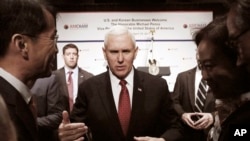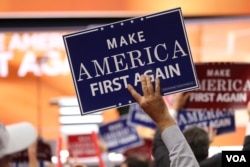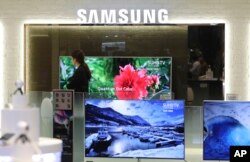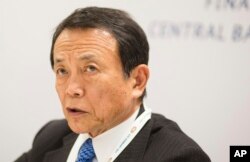During his visit to South Korea this week U.S. Vice President Mike Pence described the security alliance between the two countries as unwavering, unshakable and ironclad, but in an address to business leaders in Seoul Tuesday, he said the bilateral economic relationship is in trouble.
“Despite the strong economic ties between the United States and South Korea, we have to be honest about where our trade relationship is falling short,” Pence said.
Deficit doubled
The South Korea/U.S. free trade agreement (KORUS FTA) that took effect in 2012 was the largest trade deal implemented during the administration of former President Barack Obama. Since it was implemented the U.S. trade deficit with South Korea has more than doubled. U.S. exports to South Korea fell by $1.2 billion, while U.S. imports from South Korea grew by more than $13 billion. In 2016, the surplus measured at $23.2 billion, according to U.S. official data.
A recent United States Trade Representative (USTR) Trade Policy Agenda report criticized the U.S. trade deficit with South Korea saying, "This is not the outcome the American people expected from that agreement."
The vice president reiterated concerns voiced by the American business community that South Korea has used non-tariff related environmental and inspection regulations to undermine the FTA.
“That's the hard truth of it. And our businesses continue to face too many barriers to entry, which tilts the playing field against American workers and Americans growth,” he said.
America First
Pence said the U.S. will seek to renegotiate some terms of the trade agreement with South Korea to give American companies increased and equitable market access.
“We will pursue trade that is both free and fair. And that will be true in all of our trade relationships, including KORUS. We are reviewing all of our trade agreements across the world to insure that they benefit our economy as much as our trading partners,” Pence said.
U.S. President Donald Trump campaigned on a platform of economic nationalism that he called “America First.” He promised to overhaul trade agreements that he said hurt U.S. jobs. After taking office he immediately withdrew from the multi-lateral Trans Pacific Partnership (TPP) trade deal that was to include the U.S., Japan and ten other Pacific Rim countries, that together accounted for 40 percent of the world economy.
The Trump administration has also indicated it intends to revise the North American Free Trade Agreement with Canada and Mexico, and a U.S. trade agreement with Central American countries as well.
KORUS support
While business leaders in Seoul have been critical of the South Korean practice of imposing non-tariff related trade barriers, especially in the auto industry that accounts for 80 percent of the U.S. trade deficit, they are overall supportive of the KORUS FTA.
American Chamber of Commerce leaders have voiced concern that the Trump administration is being overly critical of the trade agreement by putting too much emphasis on a trade deficit that is just one aspect of a complex and evolving economic relationship.
For example, Korean investment in the United States, from companies like Samsung and Hyundai, have created more than 45,000 American jobs. “Direct investments Korean companies have made in the United States since KORUS have exceeded trade deficits with Korea,” said James Kim, chairman of both GM Korea and the American Chamber of Commerce Korea, in a recent Korea Times interview.
South Korea had much higher tariffs than the U.S. prior to the bilateral free trade deal and Kim Jong-hoon, the former director of the South Korean Ministry of Foreign Affairs and Trade, says the agreement yielded major concessions and cuts from his country.
Former American Chamber of Commerce Korea Chairman Jeffery Jones also argues the KORUS FTA may have prevented an even bigger drop off of U.S. imports into Korea. He notes that that all foreign imports into South Korea have been in decline in recent years, but U.S. imports dropped by only 2.8 percent, while Japanese imports were down 15 percent, Australian imports were down by 20 percent, and imports from the EU were down almost 10 percent.
On to Japan
After his meeting with business leaders in Seoul Tuesday, Vice President Pence traveled to Tokyo for meetings with Japan's Finance Minister Taro Aso on bilateral trade options in the wake of the U.S. withdrawal from TPP.
Last year, Japan had a $69 billion trade surplus with the United States, according to the U.S. Treasury Department. Trump has in the past complained that Japan keeps its currency artificially low, though a Treasury Department report last week did not label Japan a currency manipulator.
Tokyo is the second stop on Pence's 10-day tour of Asia, a trip aimed at emphasizing that U.S. President Donald Trump still intends to boost U.S. trade in the region despite his opposition to TPP.
Youmi Kim contributed to this report.








